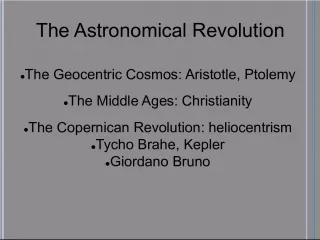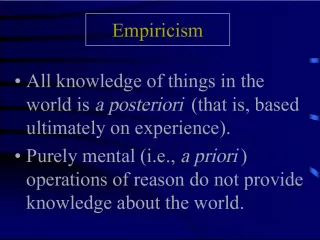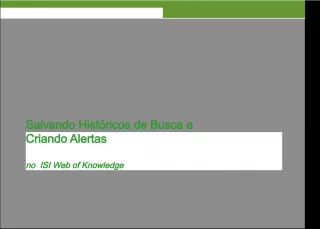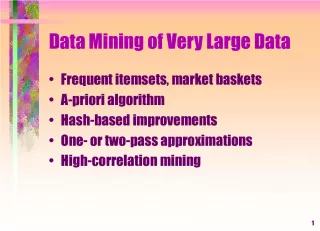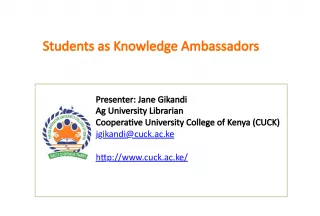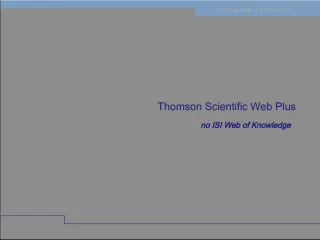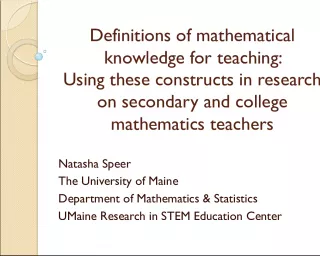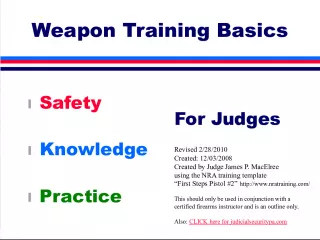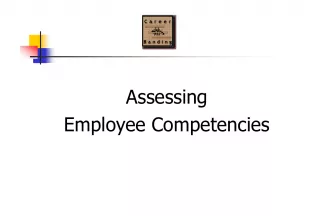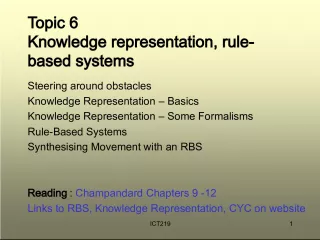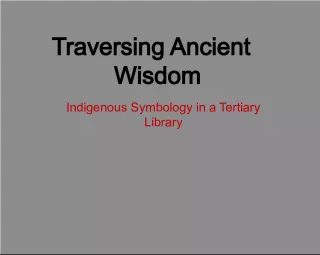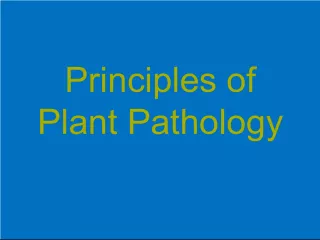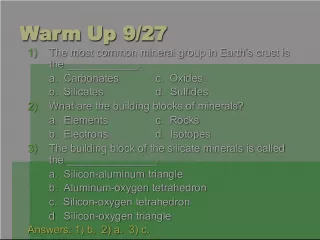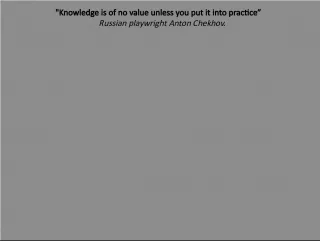Understanding A Priori and A Posteriori knowledge
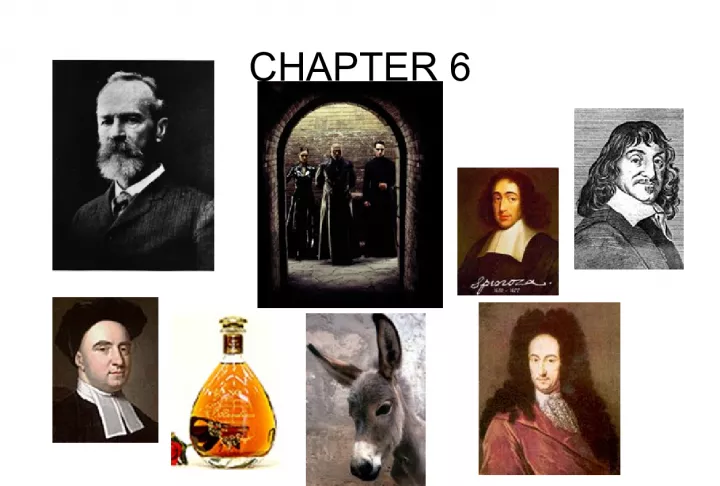

A comparison of A Priori and A Posteriori knowledge. A Priori knowledge is acquired before experience while A Posteriori knowledge is acquired after experience. Analytic knowledge is an example of A Priori knowledge while Synthetic knowledge is an example of A Posteriori knowledge.
- Uploaded on | 1 Views
-
 odell
odell
About Understanding A Priori and A Posteriori knowledge
PowerPoint presentation about 'Understanding A Priori and A Posteriori knowledge'. This presentation describes the topic on A comparison of A Priori and A Posteriori knowledge. A Priori knowledge is acquired before experience while A Posteriori knowledge is acquired after experience. Analytic knowledge is an example of A Priori knowledge while Synthetic knowledge is an example of A Posteriori knowledge.. The key topics included in this slideshow are A Priori, A Posteriori, Analytic knowledge, Synthetic knowledge, experience,. Download this presentation absolutely free.
Presentation Transcript
1. CHAPTER 6
2. Before Experience A Priori knowledge is knowledge that is acquire BEFORE experience. For example, I know that by definition a bachelor is an unmarried man- bachelor = unmarried man. In a sense I could know that without ever meeting a bachelor. A.K.A. A nalytic knowledge.
3. After Experience A Posteriori knowledge is knowledge that is acquire after some experience. For example I know that the sun sets in the west, by experience. A.K.A. Synthetic knowledge .
4. Methods of Epistemology Rationalism- knowledge by means of logic and reason. Empiricism- knowledge thru experience.
5. Rationalism Rationalism - Claim that knowledge is arrived at by means of our minds. We do not necessarily need experience to have knowledge. Rationalist claim that there exist analytic or a priori knowledge is real. A Priori knowledge - knowledge that is arrived at without experience and is necessary and certain.
6. Rene Descartes A dangerous Mix.
7. Descartes Rene Descartes argues that a rational method is required to have knowledge. Foundationalist; basic true beliefs provide a foundation for all knowledge.
8. Method of Doubt Descartes argues that a rational method is required to have knowledge. Descartes wants to determine which, if any beliefs, he has that are certain- MUST BE TRUE! He employs a method of doubt whereby he hopes to find at least one foundational belief.
9. 3 types of beliefs Descartes ask Do I have any indubitable beliefs? 3 types: Beliefs about the world. Beliefs about mathematics. Beliefs about myself.
10. 3 types of beliefs Beliefs about the world Optical illusions Beliefs about self Dreaming Beliefs about Math/ Science Evil Demon
11. Evil Demon Rene Descartes suggested that all of one's experiences might be the result of a powerful outside force, a "malicious demon." Some malicious demon of the utmost power and cunning has employed all his energies in order to deceive me. I shall think that the sky, the air, the earth, colors, shapes, sounds and all external things are merely the delusions of dreams which he has devised to ensnare my judgment." ( Meditations, 15)
12. He can doubt almost everything He employs a method of doubt whereby he arrives at his one foundational belief. The evil demon can trick you into believe 2 +2 = 5 or that you have 2 arms and 2 legs when in fact you are a fish But he cant trick you about
13. Cogito Ergo Sum I think, therefore I am.
14. I think God Exist, hence he Exist! 1. I think therefore I am 2. I have a clear and distinct conception of God. 3. In order for a lesser being to have an idea of a greater being, that idea must originate with the greater being 4. Therefore, God Exist. 5. God exist and is Good therefore he would not let the evil demon deceive us about the world. 6. Therefore the world exist as we perceive it so long as we have a clear and distinct conception of it.
15. A lower being According to Descartes a being cannot have knowledge of a being higher of the scale, unless the higher being imparts that knowledge to him.
16. Hierarchy of Being
17. Proof of Gods Existence Descartes is a lower being. His limited intellect could never hope to comprehend God unless God imparted the Knowledge. Since Descartes has a clear and distinct notion of God, God must exist!
18. Given that God exist Since God exist and is good, all of Descartes previous doubts were washed away. God would not allow an evil being to systematically deceive us. Therefore, All of Descartes Doubts are cast aside.
19. Cartesian Circle One problem with Descartes Proof, is that he knows that God exist, because he has a clear and distinct conception of him. Yet objects that we perceive Clearly and Distinctly are TRUE because God makes them so
20. I think God Exist, hence he Exist! 1. I think therefore I am 2. I have a clear and distinct conception of God. 3. In order for a lesser being to have an idea of a greater being, that idea must originate with the greater being 4. Therefore, God Exist. 5. God exist and is Good therefore he would not let the evil demon deceive us about the world. 6. Therefore the world exist as we perceive it so long as we have a clear and distinct conception of it.
21. The world as Illusion Platos Cave. Descartes Evil Demon Brain in a vat THE MATRIX
22. Platos cave Plato thought we were all prisoners, that our minds had been deceived into believing that physical objects of this world were what is real, when in fact they are mere copies of the true Forms
23. Evil Demon Rene Descartes suggested that all of one's experiences might be the result of a powerful outside force, a "malicious demon."
24. Brain in Vat Brain in a Vat hypothesis, one formulation of the idea is presented by the Philosopher Jonathan Dancy: "You do not know that you are not a brain, suspended in a vat full of liquid in a laboratory, and wired to a computer which is feeding you your current experiences under the control of some ingenious technician scientist (benevolent or malevolent according to taste).
25. Brain in Vat (continued) For if you were such a brain, then, provided that the scientist is successful, nothing in your experience could possibly reveal that you were; for your experience is ex hypothesi identical with that of something which is not a brain in a vat.
26. Brain in Vat conclusion Since you have only your own experience to appeal to, and that experience is the same in either situation, nothing can reveal to you which situation is the actual one." ( Introduction to Contemporary Epistemology, 10)
27. The MATRIX The reality that forms the lives of billions of human beings is not real. The world that seems real to most people is in fact a computer- generated simulation, but almost no one knows it.
28. THE MATRIX In reality human beings are floating in liquid in machine pods, with tubes connected to them in a grotesque post-apocalyptic world where the sun is blotted out. To the average person, of course, it seems to be the ordinary world of 1999.
29. What is real? What is real? Is seeing, tasting or touching real? Then what is real is simply an electrical impulse interpreted by our brain. Can you answer this question?
30. Pragmatic Answer Knowledge = Justified + True + Belief Pragmatic Answer: William James- Truth = useful to believe.
31. Materialism Materialism- all real objects are physical. A.K.A. physicalism. Thomas Hobbes
32. Idealism All real objects are immaterial, ideas. George Berkeley.
33. Material Dualism Some objects are physical or material. Some objects are non-physical or immaterial. Rene Descartes.
34. Mind or Body I know I have a mind, I do not know that I have a body. Therefore my Mind and Body must be distinct things. Leibnizs principle of indiscernible If X has property D & Y has property ~D Then X =\= Y Descartes concludes from this that the mind and body must be different things.
35. Why the Mind is Not the Body 1. I can doubt my Body 2. I cannot Doubt my Mind 3. If Body has Property D & Mind has Property ~D {Leibnizs principle of Indiscernible} 4. Therefore Mind =/= Body
36. Physical non physical 1. Body is Physical 2. Mind is not Physical 3. If Body has Property P & Mind has Property ~P {Leibnizs principle of Indiscernible} 4. Therefore Mind =/= Body
37. Mind Body Problem Philosophy of Mind Identity Thesis: The mind and brain are the same thing. Dualism: The mind is mental and distinct from the brain which is physical. Parallelism (Epiphenomenalism) What happens in the mind, also happens at the same time in the brain. Occasionalism- When I think (mentally) of doing something, God makes me do it physically.
38. Placebo Effect Placebo effect - just thinking you're taking something useful can make you think there's a benefit. The placebo effect was huge in patients unknowingly taking dummy pills in the arthritis study.
39. Mind over Matter Imaging tests have shown changes in the brains of placebo users, suggesting that the effect is not just "in your mind," it's also in the brain, says Dr. Stephen Straus, director of NIH's National Center for Complementary and Alternative Medicine.
40. Positive Thought, Positive Effect "Their wishful thinking that they're going to get better is harnessing the body's own mechanism for relieving pain," said Dr. Straus, whose agency was formed seven years ago to stringently test non- conventional remedies.
41. Thomas Hobbes- Materialist
42. Hobbes Materialism The only things that exist are bodies [objects] in motion. According to Hobbes, thoughts, ideas and feelings are physical entities explained by motions in the brain.
43. Conway Monism- The universe is reducible to one single substance. All objects are a mixture of physical and mental substance. Except God- who is pure actual being, non physical.
44. Potential vs. Actual God is pure actuality, Inanimate objects are pure potentiality
45. Spinoza Monist Pantheist? Or Atheist Determinist
46. Spinoza- God is everywhere Spinoza has the dubious honor of having been excommunicated from the Jewish faith. He argued that all of the universe reduced to one thing, one substance- God. Claimed God is everywhere, God is everything. Yet he was excommunicated for being an Atheist!
47. Monism One substance, 2 attributes. Material (Body) and Immaterial (Mind) Body- takes up space and has extension Mind- Thought Infinite substance has infinite attributes, but we are only aware of 2. That infinite substance is God.
48. Spinozas Determinism All actions unfold according to the necessary laws that Govern the universe. If there was no antecedent cause, there could be no effect. Jean Buridans Ass
49. Jean Buridan (1300-1358) Buridan's ass is the common name for the paradox that an entirely rational donkey, placed between two stacks of hay of equal size and quality, will starve since it cannot make any rational decision to start eating one rather than the other.
50. No cause, no effect He starved to death since he had no rational means to choose one bale of hay over the other. What about non - rational methods? What about free will According to Spinoza without an antecedent cause, there could be no effect.
51. Spinoza says we are like the Donkey Spinoza, says we are just like the Donkey. Without some internal or external influence upon us, we would be unable to act. ________ ________
52. Determined to be Free Spinoza says that once we understand the nature of the world, we can free yourself from regret or remorse. Everything that happens, all of our choices, happen necessarily. Things could not have been otherwise. As such, feel happy, feel free!
53. Leibniz The best of all possible worlds! God, being all powerful, all knowing and all good, created the best of all worlds.
54. Monads All objects in the world are composed of immaterial monads. Each monad is independent of one another, but God makes them appear to interact with one another. The appear to be in harmony.
55. 2 Principles Principle of the Identity of Indiscernibles: If two objects have the same properties then they are identical with one another. Principle of Sufficient Reason: There is a reason why things are exactly as they are and not some other way.
56. Locke Representative Realism Primary qualities Secondary qualities
57. Representative Realism The notion that we perceive objects indirectly by means of our sense and we have a representation of them in our mind. Objects, (external to us) our perceived by our senses and we form ideas of them.
58. Primary & Secondary Qualities Primary qualities are necessary qualities or attributes of something. They make it what it is. They are in the objects. Secondary or accidental qualities, are features like color, or taste. They are only in our minds, as part of our perceptions.
59. Berkeley Idealism- all objects are ideas. If we only know ideas, then why claim that there exist some underlying object. There are only ideas.
60. Berkeley- Was an empiricist. As such he thought that we can only acquire knowledge from our experiences, from our perceptions. What is the nature of our perceptions? We assume that we perceive objects, yet in fact, what we are doing when we perceive is forming ideas about objects. According to him, to exist, is to be perceived.
61. Finite Minds Finite Minds- the world is composed of two things, ideas and minds. To be a idea it must be perceived. Perceived by what? A mind. A mind is a perceiving thing. Finite minds can only perceive a limited number of ideas, so what happens to this room when no one is here to perceive it?
62. Infinite Minds Infinite Minds- Berkeley's answer is that it continues to exist because it continues to be perceived. God is an infinite mind that perceives all things. To exist is to be an idea in the mind of God.
